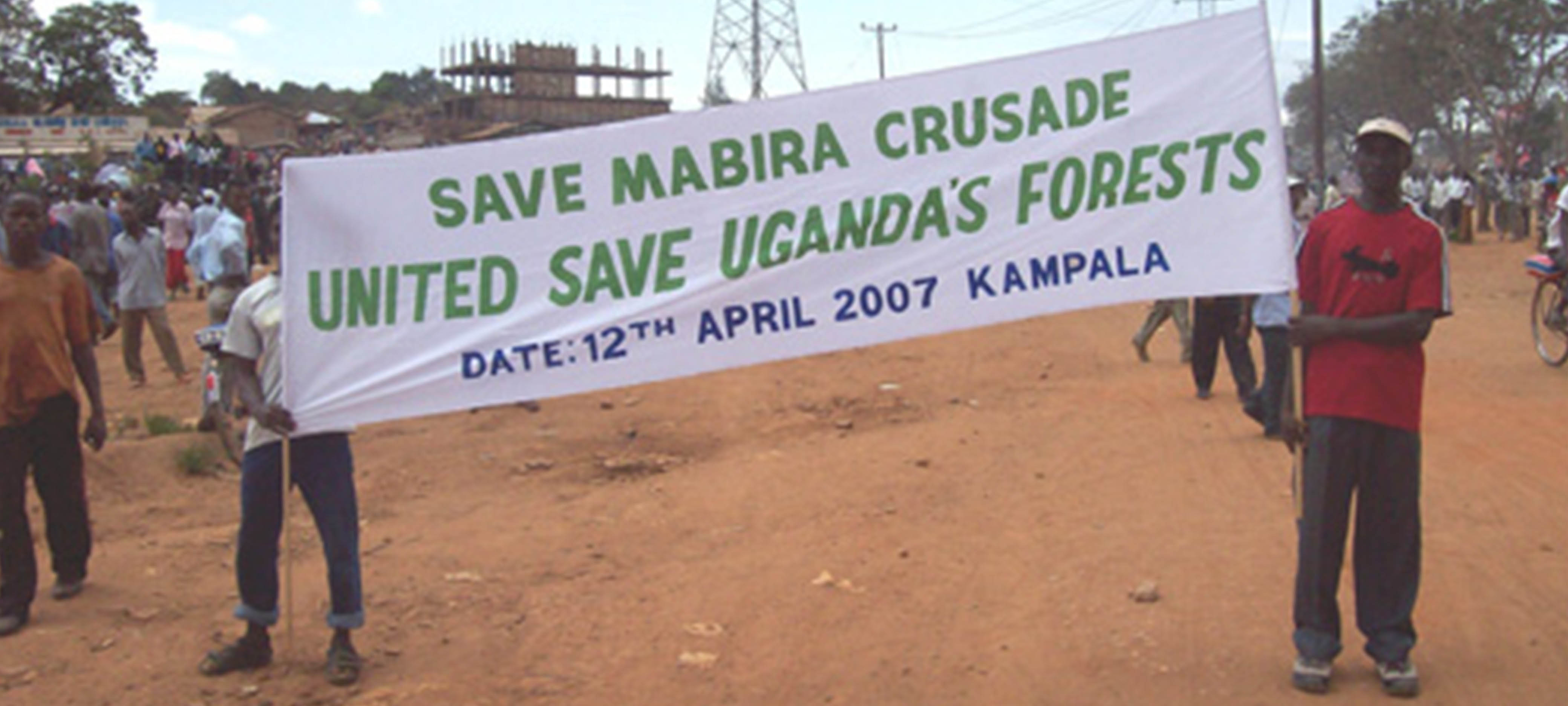- Home
- News & Information
- Success Stories
Saving Mabira Rainforest: ACODE Led Successful Advocacy Campaign to Save Protected Forest Reserve in Uganda
Posted on: 2023-06-30 00:00:00

In August 2006, the Ugandan Cabinet proposed to give away 7,100 of the 30,000 hectares of Mabira forest to the Mehta group of companies – producers of sugar – to expand their sugarcane plantation acreage. Mabira Forest is one of the remaining forest reserves in Uganda categorized as a strict nature reserve – an area to be maintained in its natural state without any exploitation for silviculture. The forest reserve is a significant natural habitat located in central Uganda, known for its rich biodiversity and ecological importance. The decision to give away part of the forest triggered public outcry and concerns from environmental activists, conservationists, and the general public.
In April 2007, a nationwide campaign dubbed “Save Mabira Crusade” was launched as a response intended to protect the Central Forest Reserve from being cleared for sugarcane plantations. Activists and concerned citizens organized protests, public demonstrations, and media campaigns to raise awareness about the ecological value of Mabira Forest and the potential environmental consequences of its destruction.
Recognizing the importance of building a collective voice, ACODE forged partnerships with like-minded organizations and individual activists, amplifying the impact of their advocacy efforts. By bringing together diverse stakeholders who shared a common goal, ACODE created a united front to protect the Forest Reserve.
The campaign garnered significant attention both locally and internationally. Several environmental organizations, NGOs, and human rights groups joined the cause, expressing their support and advocating for the protection of the forest. The movement argued that the loss of the Mabira Forest would lead to irreversible damage to the ecosystem, including the loss of plant and animal species, disruption of livelihoods for local communities, and negative impacts on climate regulation.
The campaign employed alternative approaches and multi-pronged strategies to garner support and raise awareness about the danger of forest giveaways. ACODE leveraged various channels, including community engagement, public events, media platforms, and the courts of law to effectively communicate the importance of safeguarding the forest reserves. The involvement of the media played a crucial role in disseminating information, mobilizing public support, and increasing the campaign's visibility.
Central to the success of the Save Mabira Crusade was the use of empirical data and analyses. ACODE developed and shared compelling evidence, highlighting the environmental significance and economic value of the forest reserve. By presenting well-documented research and data, the campaign effectively made its case for the preservation of the Mabira Forest Reserve, capturing the attention of decision-makers and the wider public.
The Save Mabira Crusade faced opposition from proponents of the sugarcane project, including the Ugandan government, who argued that the plantation would create jobs and boost the country's economy. However, activists and concerned citizens emphasized the long-term ecological value of the forest over short-term economic gains.
As the campaign gained momentum, the issue became highly politicized, with debates and discussions taking place at national and international levels. The Save Mabira Crusade succeeded in attracting widespread attention and support, leading to a significant public debate on the importance of environmental conservation and sustainable development.
Ultimately, due to the sustained pressure from the campaign and the public outcry, the Ugandan government decided to halt the decision. The campaign was seen as a victory for environmental conservation efforts in Uganda, highlighting the power of public mobilization and activism in protecting valuable natural resources.
Lessons learned from the campaign emphasize the systematic and rigorous nature of effective advocacy. Creating partnerships, building a collective voice, and developing alternative approaches were vital in mobilizing support and driving change. The campaign also underscored the importance of endurance and commitment, as advocacy efforts often require sustained engagement and perseverance.
The success of the Save Mabira Crusade serves as a powerful example of the impact that civil society organizations can have in shaping policy and protecting critical natural resources. ACODE's advocacy work has not only safeguarded forest reserves but also empowered Ugandans to demand accountability from their government on environmental issues. The campaign ignited a growing willingness among citizens to actively engage in the development debate, ensuring that their voices are heard and their concerns addressed.
Moving forward, ACODE remains committed to environmental conservation and strengthening civil society's voice in Uganda. The success of the Save Mabira Crusade serves as a guiding light for future advocacy efforts, emphasizing the importance of partnerships, data-driven approaches, and sustained commitment. ACODE’s work aims to protect and preserve Uganda's natural heritage for future generations.
More Stories
Citizen Engagement Stories
Kosike Women Petition District Council, Citing Dangerous 8km Journeys to Access Maternal Healthcare
Citizen Engagement Stories
Caught Between Conservation and Survival: The IK Community’s Call for Inclusive Conservation in Karamoja
Citizen Engagement Stories
Community Action Led to Critical Infrastructure Projects in Nebbi and Kotido Districts
